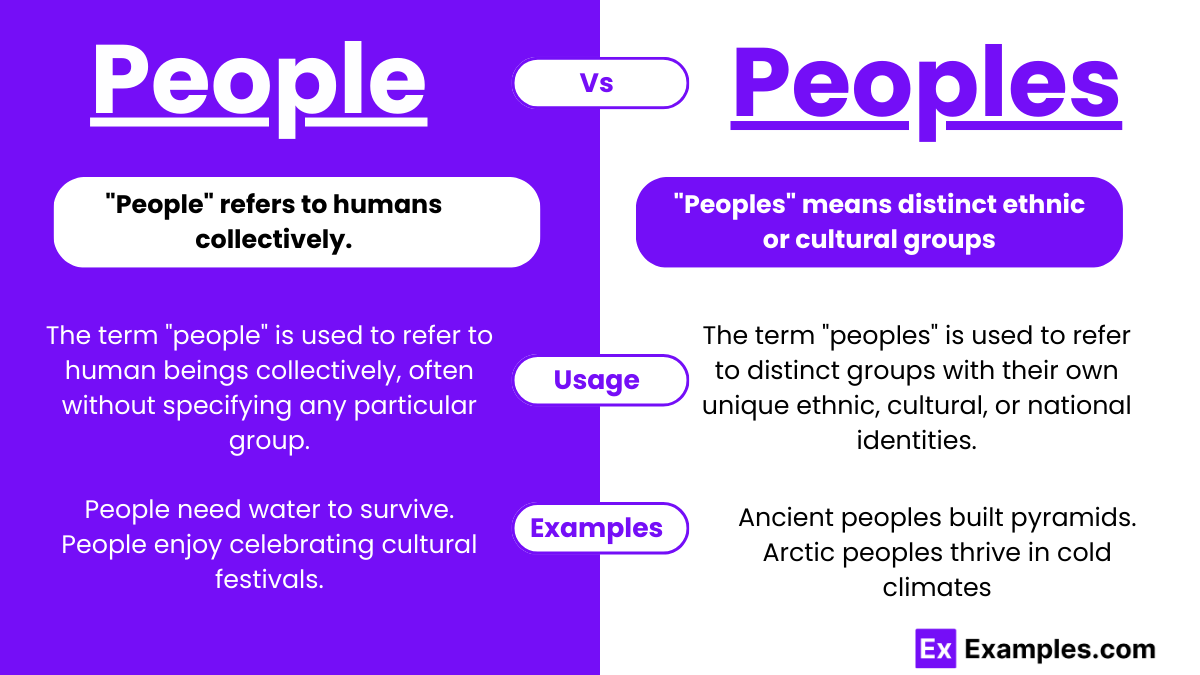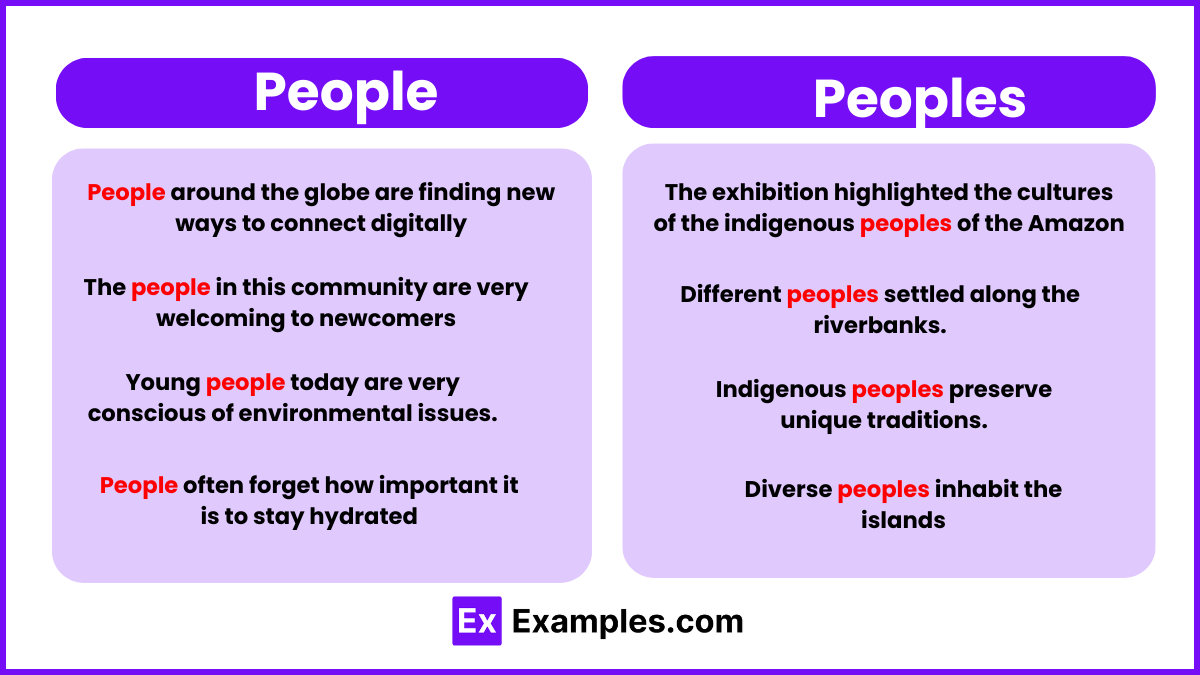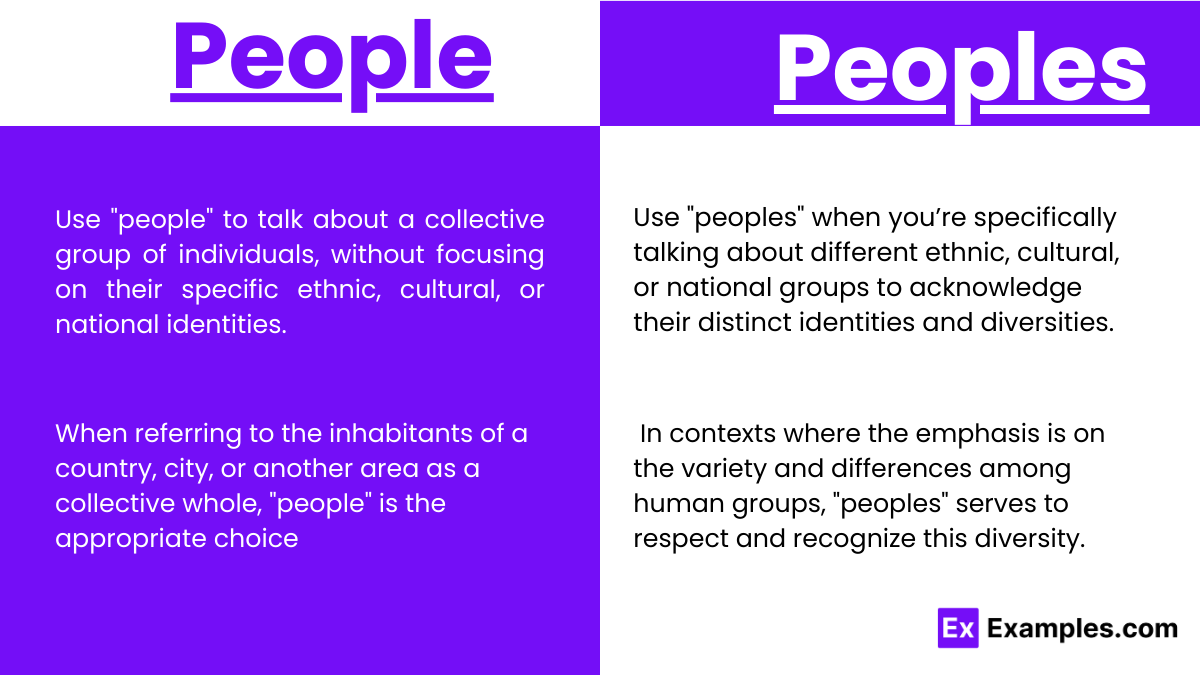People vs Peoples – Examples, Difference, Tricks, How to use
The distinction between “people” and “peoples” often causes confusion, but understanding their usage can significantly improve the precision of your communication. “People” typically refers to a group or collection of individuals without specifying nationality, race, or culture. It is used to talk about a large group of individuals in a general sense, such as in the context of a country’s population or when referring to individuals from multiple backgrounds collectively.
On the other hand, “peoples” is used when referring to distinct ethnic, cultural, or national groups within a larger context. This plural form emphasizes the diversity and distinctiveness of groups within a whole. For example, discussing the various indigenous peoples of the Americas highlights not just the presence of different groups but their unique cultures, languages, and histories as separate entities.
People and Peoples – Meaning
- People : generally refers to a group of individuals, often used to denote humans collectively without specifying their nationality, ethnicity, or other distinguishing characteristics. It is a singular collective noun that can describe a group of men, women, and children of any composition and size. In most contexts, “people” is used to talk about a specific number of individuals or the inhabitants of a certain area, emphasizing the idea of a unified group without delving into the specific identities within that group.
- Peoples: on the other hand, is the plural form of “people” used distinctly to refer to multiple ethnic, cultural, or national groups. This term acknowledges the diversity and differences among groups, highlighting their unique identities, traditions, and histories. It’s particularly used in discussions about various ethnic and cultural groups within a larger population or in a global context, where recognizing these distinctions is crucial for understanding social, political, and historical dynamics.
Summary
While “people” and “peoples” may seem similar at first glance, their uses are nuanced and significant. “People” is a collective noun that refers broadly to human beings as a group, without emphasis on their specific cultural or ethnic identities. It can denote a population within a country, a group within a community, or humanity as a whole, focusing on the collective aspect rather than individual distinctions. In contrast, “peoples” specifically acknowledges the diversity among human groups, used when referring to multiple ethnic or cultural groups to highlight their distinct characteristics and histories.
How to Use People and Peoples
Understanding when to use “people” and “peoples” correctly is key to accurate and respectful communication, especially when discussing topics related to culture, ethnicity, and community. Here’s a straightforward guide on how to use these terms effectively.
Using “People”:
- General Group Reference: Use “people” when referring to a group of individuals in a general sense, without specifying their ethnic, cultural, or national identities. It’s applicable when talking about humans collectively or about inhabitants of a region or country.
- Singular Group with Common Characteristics: When talking about a specific group with shared characteristics or identities, “people” is still appropriate, treating the group as a single entity.
Using “Peoples”:
- Distinct Ethnic or Cultural Groups: Use “peoples” when referring to multiple distinct groups, especially in discussions that recognize the diversity within larger populations or across the globe. It emphasizes the uniqueness and separateness of each group.
- Acknowledging Diversity: In contexts where it’s important to highlight the variety and differences among human groups, “peoples” serves to respect and acknowledge this diversity.
Examples of People and Peoples
Examples of People
- People around the globe are finding new ways to connect digitally.
- The people in this community are very welcoming to newcomers.
- Young people today are very conscious of environmental issues.
- People often forget how important it is to stay hydrated.
- In ancient times, people believed the earth was flat.
Examples of Peoples
- The exhibition highlighted the cultures of the indigenous peoples of the Amazon.
- Historians study the movements and interactions of different peoples to understand the past.
- The peoples of the Pacific Islands have navigated the ocean for thousands of years.
- Various peoples across the continent celebrate the solstice in unique ways.
- The conference focused on the rights of minority peoples around the world..
Difference Between People and Peoples
| Aspect | People | Peoples |
|---|---|---|
| Definition | Refers to a group of individuals, often used in a general sense to denote humans collectively. | Used to denote multiple distinct ethnic, cultural, or national groups. |
| Usage | Used when talking about a non-specific group of individuals or the inhabitants of a certain area. | Employed when acknowledging the diversity among different groups, especially in cultural or ethnic contexts. |
| Examples | – The people of Italy enjoy a Mediterranean diet.<br>- Many people are moving towards sustainable living. | – The indigenous peoples of the Amazon have unique traditions.<br>- Various peoples of the world celebrate distinct festivals. |
| Noun Type | Singular collective noun that refers to a group as a whole. | Plural noun that emphasizes the distinct identities within a larger group. |
| Contextual Focus | On the collective or general aspect of a group without emphasizing individual distinctions within the group. | On the diversity and distinctiveness of groups, highlighting their unique cultures, languages, and histories. |
| Grammatical Number | Treated as plural (e.g., “The people are”) but refers to the group in a collective sense. | Explicitly plural, indicating multiple groups (e.g., “These peoples have”). |
Tricks to Remember People and Peoples
Distinguishing between “people” and “peoples” can be straightforward with some memorable tricks. Here’s how you can remember the differences:
For “People”:
- Think of “E” for Everyone: The word “people” has a single “e” in its key part. Think of this “e” as standing for “everyone” in a collective or general sense. When you’re talking about a group as a whole without focusing on their distinct characteristics, use “people.”
- People = Population: Associate “people” with the general population of a place or group. If you’re referring to the inhabitants of a country or any large, undivided group, “people” is your go-to word.
For “Peoples”:
- Double “E” for Ethnic Groups: “Peoples” contains a double “e,” which you can remember by associating each “e” with different ethnic groups. The presence of an extra “e” can signify the extra attention to the distinct groups within the larger human population.
- S for Separate: The “s” in “peoples” can remind you of “separate” or “specific.” Use “peoples” when you are talking about specific groups with distinct identities, especially in cultural, ethnic, or national contexts.
When to Use People and Peoples
The choice between “people” and “peoples” hinges on the context of your discussion—whether you’re referring to a general group without specifying or to multiple distinct groups with unique identities. Here’s a guide on when to use each term.
Use “People” When:
- Referring to a General Group: Use “people” to talk about a collective group of individuals, without focusing on their specific ethnic, cultural, or national identities. This is applicable in most general contexts.
- Example: “People around the world are increasingly concerned about climate change.”
- Talking About Inhabitants: When referring to the inhabitants of a country, city, or another area as a collective whole, “people” is the appropriate choice.
- Example: “The people of Brazil are known for their festive culture.”
Use Peoples When:
- Discussing Multiple Ethnic or Cultural Groups: Use “peoples” when you’re specifically talking about different ethnic, cultural, or national groups to acknowledge their distinct identities and diversities.
- Example: “The exhibition celebrates the art of indigenous peoples of North America.”
- Highlighting Diversity: In contexts where the emphasis is on the variety and differences among human groups, “peoples” serves to respect and recognize this diversity.
- Example: “Throughout history, the peoples of the Mediterranean have exchanged goods and ideas.”
Tips for Correct Usage:
- General vs. Specific: Remember, “people” is for more general references to groups of individuals, while “peoples” is used for more specific references to multiple distinct groups.
- Cultural Sensitivity: Choosing the correct term shows respect for the identity and uniqueness of cultural, ethnic, and national groups, so it’s important to use “peoples” when such specificity and recognition are needed.
- Contextual Clues: The context in which you’re writing or speaking often dictates the correct choice. Discussions involving anthropology, sociology, and cultural studies are more likely to require the use of “peoples” to accurately represent the subjects being discussed.
By understanding these distinctions and applying them thoughtfully, you can communicate more precisely and respectfully, especially in multicultural and diverse contexts.
Synonyms For People and Peoples
| Term | Synonyms for “People” | Synonyms for “Peoples” |
|---|---|---|
| General | individuals, persons, folks, inhabitants, populace | ethnic groups, tribes, nationalities, cultures, clans |
| Formal | citizens, population, residents, community, society | civilizations, societies, communities, ethnicities |
| Informal | guys, crowd, gang, bunch, crew | – |
| Specific | populace, electorate, demographic, congregation, assembly | indigenous groups, cultural groups, ancestral groups |
| Cultural | – | nations, races, kindreds, lineages, heritage groups |
Exercise
- he ________ of the Arctic have adapted to extremely cold temperatures.
- In the city, you’ll find ________ from all walks of life.
- The diverse ________ of the Amazon rainforest include numerous indigenous groups.
- ________ who read widely tend to have broader vocabularies.
- The museum’s new exhibit showcases the crafts of the native ________ of North America.
- The ________ of this small island are known for their hospitality.
- Different ________ have unique traditions that are passed down through generations.
- ________ often seek comfort in familiar routines.
- The ancient ________ of the Mediterranean had rich trading networks.
- Digital platforms allow ________ to connect across vast distances.
Answers
- peoples
- people
- peoples
- People
- peoples
- people
- peoples
- People
- peoples
- people
FAQs
Is a people plural or singular?
“A people” is treated as a singular noun when it refers to a collective group of individuals who share a common culture, language, or identity. It emphasizes the group as a single entity, representing the entire community or nationality as one unit.
Is peoples a plural noun?
“People’s” is not plural; it is the possessive form of “people,” which is already a plural noun. It indicates ownership or association with a group of individuals. For example, “the people’s choice” means the choice made by the people collectively.
When should I use peoples?
You should use “peoples” when referring to multiple distinct groups, each with their own unique identities, cultures, languages, or nationalities. It acknowledges the diversity among these groups, especially in contexts discussing various ethnic, cultural, or national groups within a larger population or across the globe. Use “peoples” to emphasize the differences and distinctiveness of each group.




